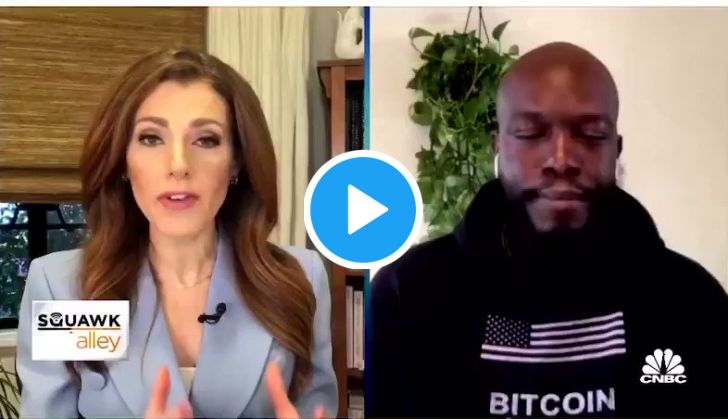[🔎] Bitcoin and the Black community
How some Black Americans are turning to Bitcoin as a way to exit a banking system that has failed to serve them.
In this issue:
The history of American banking is a history of racism
Bitcoin is an opportunity to exit
Bitcoin voices emerging in the Black community
The history of banking in America is a history of racism
When people talk about systemic racism banking is one of the most powerful systems they are talking about. Banks in America have historically been a very explicit tool for exploiting and oppressing Black Americans. Slaves literally built the wall after which Wall Street is named.
The very first bank to serve Black Americans was the Freedman Saving’s Bank founded after the civil war to serve newly freed slaves. A white member of its board of directors (Henry Cooke) used his position to obtain unsecured loans from the Freedman’s bank for his other business ventures. In the contraction of 1873 those ventures collapsed and in the process destroyed the Freedman’s bank and ~$3M (~$68M in today’s dollars) worth of savings in the process.
In 1934 FDR passed the National Housing Act and established the Federal Housing Authority (FHA), whose goal was to spur the creation of more housing by offering subsidized mortgages throughout America. The FHA decided that Black families were inherently bad for property value so they designated any Black neighborhoods or even nearby neighborhoods as being "high risk" and refused to offer mortgage support there - a policy known as redlining.
Amber Ruffin has a good overview of the process:
Unfortunately this isn’t only a historical problem. The practice of redlining has morphed but it hasn’t really gone away. Black Americans were also systematically targeted for the subprime loans at the center of the 2008 financial crisis - the city of Baltimore even sued Wells Fargo (they settled). Testimony revealed employees of the bank referred to those customers as "mud people" and the subprime mortgages themselves as ghetto loans. Mortgages held by Black Americans are more than 4x as likely to be subprime, even when many of them could have qualified for higher quality mortgages.
Obviously this list could go on a lot longer. Racism is everywhere in America, but the history of racism in banking is especially pernicious and damaging.
Bitcoin is an opportunity to exit
We usually talk about Bitcoin as a technology for dissidents actively resisting their government - but Bitcoin is useful money for any disenfranchised group. For a community that has been systematically mistreated or ignored by banks, the phrase "Be your own bank" carries even more significance. Bitcoin offers them not just a way to opt out of their local currency but to opt out of the banking system entirely.
To quote Isaiah Jackson, author of Bitcoin and Black America:
“For the first time in history, we have a Plan B option to the current financial system which has seen years of redlining, racial discrimination and other egregious acts by retail banks to the Black community, and in my opinion, the Black community has the opportunity to shift our mindset and our money. We can shift our energy into Bitcoin and cryptocurrency because there is no barrier to entry, it’s unconfiscatable, which is something we have not seen in the history of the United States for the Black community, so I think Bitcoin is a step in the right direction and it can definitely help in the long term” - Isaiah Jackson
This perspective on Bitcoin slots neatly into existing movements and conversations about the Black Dollar, the effort to build Black wealth by encouraging spending at Black owned businesses. If you are working to build a parallel economy and have a historically well justified distrust of banks, Bitcoin is very practical tool.
Voices emerge within the community
Increasingly Bitcoin missionaries are emerging with a specific focus on bringing Bitcoin understanding to the Black community. Obviously the most direct example is Isaiah Jackson and his book Bitcoin and Black America, which is both an introduction to Bitcoin generally and a forceful argument for Black Americans to start using it:
Jackson also partners with Lamar Wilson on a recurring podcast and clubhouse called Bitcoin Black Billionaires.
Outside of cryptocurrency circles, NFL star Russel Okung famously negotiated to be paid half his salary in Bitcoin. His Twitter presence is a relentless stream of Bitcoin advocacy:
Tonya Evans is a Professor of Law who works in the intersection of blockchains and the courts.
Dr Boyce Watkins is a financial commentator and author of several books about Black entrepreneurship and personal wealth building.
There are of course many other podcasts, clubhouses, twitter streams and newsletters that are - please share any that you follow in the comments!
No Bitcoin will not cure racism
It is regrettable but important to remember that racists can and do use Bitcoin as well. The people advocating for Bitcoin adoption in the Black community are not making the argument that Bitcoin is a panacea that will wash away America’s sins.
Bitcoin itself is neither moral nor immoral, it is simply a tool. But it is a tool that empowers individuals and dis-empowers banks and large financial institutions. For populations that have historically been at the mercy of those institutions, that tool may be an especially powerful one.
Happy #BlackFutureMonth, everyone.








